 Petzlover
Petzlover Alaskan Klee Kai is originated from United States but Bloodhound is originated from United Kingdom. Alaskan Klee Kai may grow 10 cm / 3 inches shorter than Bloodhound. Alaskan Klee Kai may weigh 57 kg / 125 pounds lesser than Bloodhound. Alaskan Klee Kai may live 8 years more than Bloodhound. Alaskan Klee Kai may have less litter size than Bloodhound. Both Alaskan Klee Kai and Bloodhound requires Low Maintenance.
Alaskan Klee Kai is originated from United States but Bloodhound is originated from United Kingdom. Alaskan Klee Kai may grow 10 cm / 3 inches shorter than Bloodhound. Alaskan Klee Kai may weigh 57 kg / 125 pounds lesser than Bloodhound. Alaskan Klee Kai may live 8 years more than Bloodhound. Alaskan Klee Kai may have less litter size than Bloodhound. Both Alaskan Klee Kai and Bloodhound requires Low Maintenance.
 Alaskan Klee Kai breed is created in Alaska by Linda S Spurlin with help of her family. When she saw a smaller type of Siberian Husky, she immediately wanted to create a smaller type of Husky that will be a great companion dog. She did not create this breed with dogs that suffer from dwarfism as if it’s the case with most other breeders. She breeds Alaskan Husky with smaller dog breeds that looked a like a husky. Breeds like Alaskan Eskimo Dog or Schipperke. They are still not recognized by some Kennel clubs, but their popularity is constantly on the rise.
Alaskan Klee Kai breed is created in Alaska by Linda S Spurlin with help of her family. When she saw a smaller type of Siberian Husky, she immediately wanted to create a smaller type of Husky that will be a great companion dog. She did not create this breed with dogs that suffer from dwarfism as if it’s the case with most other breeders. She breeds Alaskan Husky with smaller dog breeds that looked a like a husky. Breeds like Alaskan Eskimo Dog or Schipperke. They are still not recognized by some Kennel clubs, but their popularity is constantly on the rise.
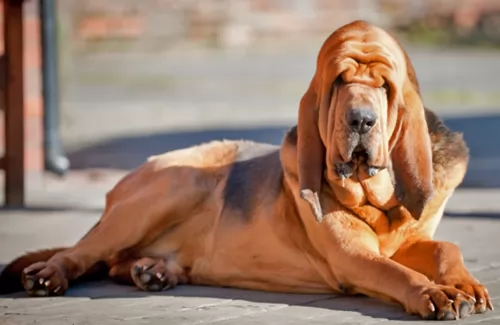 The history of the Bloodhound breed is a fascinating one. Known as a Sleuthhound for its ability to smell out the culprit and bag the prey. Even more so the Bloodhound is known for tracking and finding lost people. He is famous for finding human scents and being able to follow them even days or weeks after the person is lost. They are also able to track people over a great amount of land and have been known to successfully track escaped prisoners or wanted criminals. They are descended from the Saint-Hubert Hounds that were bred at the Abbey/Monastery at Saint-Hubert, Belgium. According to the legends the St. Hubert hounds were bred by the Monks in 1000AD. This hound was thought to be a mixed breed rather than a purebred. That’s because the ancestry of this hound is not really known but it is known that the monks bred them and sent several to the King of France annually. Only black hounds were gifted.
The history of the Bloodhound breed is a fascinating one. Known as a Sleuthhound for its ability to smell out the culprit and bag the prey. Even more so the Bloodhound is known for tracking and finding lost people. He is famous for finding human scents and being able to follow them even days or weeks after the person is lost. They are also able to track people over a great amount of land and have been known to successfully track escaped prisoners or wanted criminals. They are descended from the Saint-Hubert Hounds that were bred at the Abbey/Monastery at Saint-Hubert, Belgium. According to the legends the St. Hubert hounds were bred by the Monks in 1000AD. This hound was thought to be a mixed breed rather than a purebred. That’s because the ancestry of this hound is not really known but it is known that the monks bred them and sent several to the King of France annually. Only black hounds were gifted.
Some kings preferred not to hunt with these hounds thinking them not good enough while others thought the only use for them was as a leash hound. All described the St. Hubert as long in body with short legs. These gifts continued until the French Revolution when hunting in France was greatly reduced until the 19th century. The original St. Hubert strain became extinct in the 19th century and that the current European St. Hubert hound has its origins in the Bloodhound. The Bloodhound as a separate breed was already established in Europe by the middle of the 14th century. They were used as leach hounds to sniff out the prey so that the pack hounds could chase and keep it “at bay”. They were also used from the beginnings of the breed to track humans. At this time they were often known as sleuth hounds. As recorded by John Caius – the authority on Bloodhounds from their origins – writes about the breeds ability to find and track the scent of blood – thus becoming the Bloodhound and its use to track poachers and thieves. He also reported that the Bloodhound and the Sleuth Hound were the same basic breed. The number of Bloodhounds in Britain gradually declined until few remained after World War II. Britain has gradually built their breed back up by importing dogs from America. It was during the 19th century that the Bloodhound was imported into France by breeders who wished to reestablish the St. Hubert Hound. Thus the St. Hubert is both the ancestor and descendent of the Bloodhound. The Britain’s continue to believe that the Bloodhound is a native British breed.
The Bloodhounds in America have had great success as companion animals, with police departments and forest rangers and showing in the prestigious Westminster Kennel Club in New York. There are more Bloodhounds in the United States than anywhere else in the world.
In the end the Anglo-Saxton Bloodhound cannot be specified with any real certainty. Many believe it was not the St. Hubert that the Bloodhound descended from but rather the Norman hound or the sleuth-hound. Many believe it could have included other breeds such as the southern hound, the dun-hound and the Talbot. It cannot be proven today it the Bloodhound’s origins come from Belgian or England.
 Weight of the Alaskan Klee Klei variates from dog to dog, but average male size is between 33-44cm. While females size is 28-40cm. The weight of the average male, an adult dog is 13 to 15kg. As you may see Klee Klei can be very small dogs, and that depends on every dog.
Weight of the Alaskan Klee Klei variates from dog to dog, but average male size is between 33-44cm. While females size is 28-40cm. The weight of the average male, an adult dog is 13 to 15kg. As you may see Klee Klei can be very small dogs, and that depends on every dog.
A lifespan of Klee Klei is 12-16 years.
Litter Size of the breed again depends on every dog but normal size for this breed is between 4-8 puppies.
Other Name for Alaskan Klee Klei is just a Klee Klei.
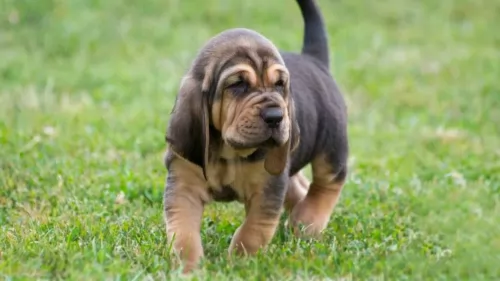 When being judged for confirmation in a show ring, the preference is for a larger dog, with an unusual skeleton in respect to its large size and heavy weight in the bones. They have a narrow head, flat at the sides, but long. They have deep set eyes buried in the deep, long face and wrinkles. The eyes might be yellow or run the gamut to deep hazel depending upon the color of the dog. The long velvety ears and thin and low set on the head. These long ears are as much a part of the Bloodhounds Olfactory system as his amazing nose. They curl backward and inward as the ends. There is a large amount of loose skin on the head and at the jowls. When the Bloodhound lowers his head the loose folds and ridges of skin are prominent on the face and forehead.
When being judged for confirmation in a show ring, the preference is for a larger dog, with an unusual skeleton in respect to its large size and heavy weight in the bones. They have a narrow head, flat at the sides, but long. They have deep set eyes buried in the deep, long face and wrinkles. The eyes might be yellow or run the gamut to deep hazel depending upon the color of the dog. The long velvety ears and thin and low set on the head. These long ears are as much a part of the Bloodhounds Olfactory system as his amazing nose. They curl backward and inward as the ends. There is a large amount of loose skin on the head and at the jowls. When the Bloodhound lowers his head the loose folds and ridges of skin are prominent on the face and forehead.
For many centuries all different colors of Bloodhounds could be found. Today however they are pretty much red, black and tan and black and liver. The Bloodhound is a powerful dog and is larger than most breeds of hounds.
 Klee Klei is very intelligent breed with a lot of energy. They love spending time with the family, especially in the outdoor activities. Klee Klei is very friendly towards children and new people, but they will also be excellent watchdogs too. Due to their intelligence, they are very easy to train. You should practice a positive way of awarding for them. They love pleasing and they love food, so it is a match made in heaven for training the Klee Klei. They will enjoy playing with other animals because they love to run and spend time with them, but you must socialize them from the early age. It is very important to socialize them with other animals and you will not have anything to worry about. They have a high prey drive so you will have to keep them on the leash while walking because if they notice something they will run towards it immediately. So for your, and your pet's safety, it is the best to keep the leash on. They do not bark a lot, but they will express when they are not pleasured because they can be very sensitive
Klee Klei is very intelligent breed with a lot of energy. They love spending time with the family, especially in the outdoor activities. Klee Klei is very friendly towards children and new people, but they will also be excellent watchdogs too. Due to their intelligence, they are very easy to train. You should practice a positive way of awarding for them. They love pleasing and they love food, so it is a match made in heaven for training the Klee Klei. They will enjoy playing with other animals because they love to run and spend time with them, but you must socialize them from the early age. It is very important to socialize them with other animals and you will not have anything to worry about. They have a high prey drive so you will have to keep them on the leash while walking because if they notice something they will run towards it immediately. So for your, and your pet's safety, it is the best to keep the leash on. They do not bark a lot, but they will express when they are not pleasured because they can be very sensitive
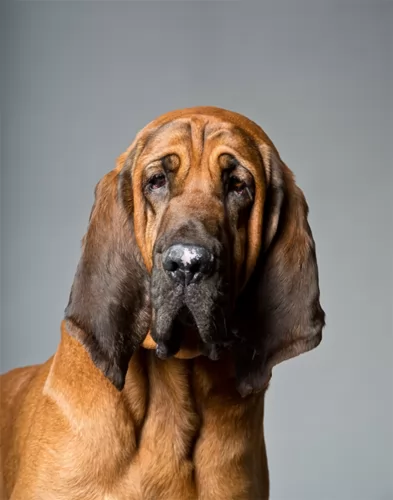 The Bloodhound is known as a gentle soul and he truly is. They are affectionate and gentle with people and children. However, their strong will to track can make them stubborn and hard to handle and train. They are easy going dogs and really like to be with people, children and other dogs. They are affectionate but tend to be set in their ways.
The Bloodhound is known as a gentle soul and he truly is. They are affectionate and gentle with people and children. However, their strong will to track can make them stubborn and hard to handle and train. They are easy going dogs and really like to be with people, children and other dogs. They are affectionate but tend to be set in their ways.
 As most of the small breed dogs that are mixed with various breeds, this is one of the healthiest breeds. They do not have a lot of health issues, and usually, they tend to live a lot. Of course, you must be careful where are you buying your dog, and it is very important to choose the right owners that are taking care of the dogs and puppies. Some of the issues that this breed might have are luxation patella, thyroid disease, heart conditions, liver shunts, factor VII deficiency, and cataracts.
As most of the small breed dogs that are mixed with various breeds, this is one of the healthiest breeds. They do not have a lot of health issues, and usually, they tend to live a lot. Of course, you must be careful where are you buying your dog, and it is very important to choose the right owners that are taking care of the dogs and puppies. Some of the issues that this breed might have are luxation patella, thyroid disease, heart conditions, liver shunts, factor VII deficiency, and cataracts.
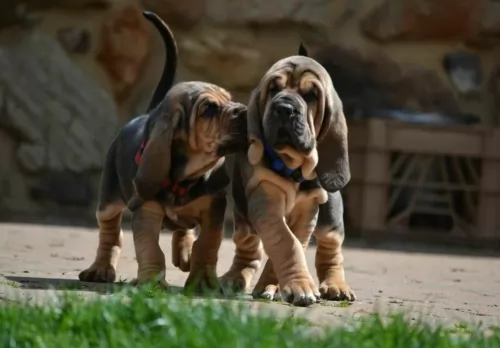 Obviously with ears like the Bloodhound there is always a chance for problems and serious infections. The ears need to be cleaned daily. Because their coat is so thick, they can overheat easily, and they are very prone to bloat, as are many large animals. However, with the Bloodhound, Bloat is the number one killer. Their lifespan is one of the shortest of all dogs at 6.75 years.
Obviously with ears like the Bloodhound there is always a chance for problems and serious infections. The ears need to be cleaned daily. Because their coat is so thick, they can overheat easily, and they are very prone to bloat, as are many large animals. However, with the Bloodhound, Bloat is the number one killer. Their lifespan is one of the shortest of all dogs at 6.75 years.
 Since they are highly energetic dogs they will need a lot of fuel for playing and spending time outside. Feeding of your dog depends on daily activity, but overall you should consult with dog nutritionist for a better understanding of your dog needs.
Since they are highly energetic dogs they will need a lot of fuel for playing and spending time outside. Feeding of your dog depends on daily activity, but overall you should consult with dog nutritionist for a better understanding of your dog needs.
Puppies need more food divided into 3-5 meals per day. They would eat everything you have for them. 3-5 high-quality dry food would be enough with additional vitamins and minerals.
Normally, Klee Klei groom themselves, so you won’t have to do it too often. Again, you will have to take care of your dog with occasional baths and brushing. You will know when is the time to take care of your lovely Klee Klei, but they will do most of the work.
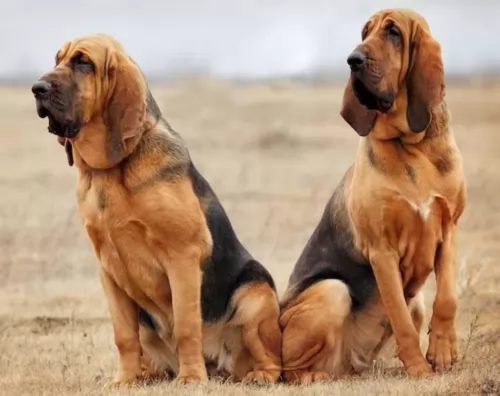 The Bloodhound is not a high energy, fast moving dog but that does not mean he doesn’t have serious nutritional needs. An overweight Bloodhound is on a course to an early demise. They should be fed a high-quality food once a day or split into two daily servings. Do not feed them right before or right after strenuous exercise and remember that strenuous exercise for a Bloodhound is considerably less than it is for a terrier.
The Bloodhound is not a high energy, fast moving dog but that does not mean he doesn’t have serious nutritional needs. An overweight Bloodhound is on a course to an early demise. They should be fed a high-quality food once a day or split into two daily servings. Do not feed them right before or right after strenuous exercise and remember that strenuous exercise for a Bloodhound is considerably less than it is for a terrier.
As previously mentioned the number one cause of death in Bloodhounds is Bloat. They are also prone to cancer. They have minor issues with their eyes, but their ears and skin are also major concerns. Clean the ears daily and wipe out the skin folds and wrinkles to prevent infections. They should be test for hip and elbow dysplasia simply because they are large dogs, though these conditions are less common in Bloodhounds.
Though the Bloodhound is known as a couch potato his stamina and activity levels are usually greatly underestimated. He can follow a scent for 7-10 hours over miles of terrain with out a problem. He needs daily exercise such as long walks on a leash. Do not take your Bloodhound out off leash because if he picks up a scent and wanders off you will not be able to get his attention to call him back.